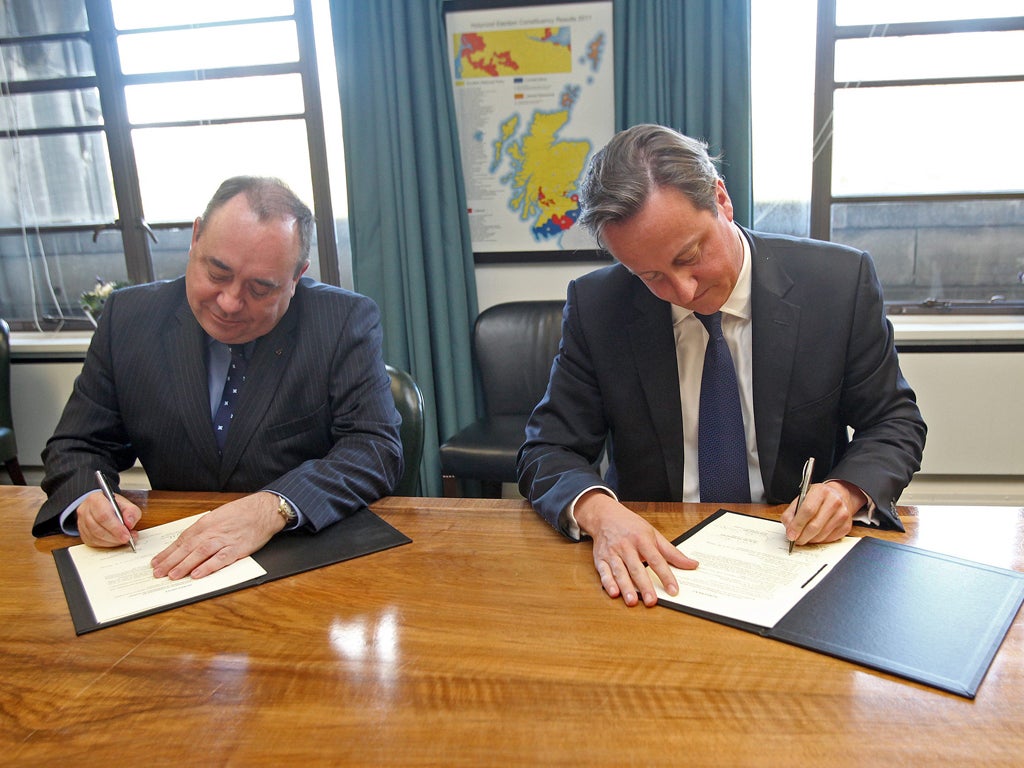Scots 'better off in UK' – Cameron sets out stall for Independence campaign

Your support helps us to tell the story
From reproductive rights to climate change to Big Tech, The Independent is on the ground when the story is developing. Whether it's investigating the financials of Elon Musk's pro-Trump PAC or producing our latest documentary, 'The A Word', which shines a light on the American women fighting for reproductive rights, we know how important it is to parse out the facts from the messaging.
At such a critical moment in US history, we need reporters on the ground. Your donation allows us to keep sending journalists to speak to both sides of the story.
The Independent is trusted by Americans across the entire political spectrum. And unlike many other quality news outlets, we choose not to lock Americans out of our reporting and analysis with paywalls. We believe quality journalism should be available to everyone, paid for by those who can afford it.
Your support makes all the difference.Prime Minister David Cameron has launched a defence of the United Kingdom as his government prepares to put the “facts” about Scottish independence to the public.
While people in Scotland will make the decision in autumn next year, the implications will have obvious impacts across England, Wales and Northern Ireland, the Conservative leader said.
"Britain is admired around the world as a source of prosperity, power and security," he said.
"Those glorious Olympics last summer reminded us just what we were capable of when we pull together: Scottish, English, Welsh, Northern Irish, all in the same boat - sometimes literally.
"If you told many people watching those Olympics around the world that we were going to erect barriers between our people, they'd probably be baffled. Put simply: Britain works. Britain works well. Why break it?"
Addressing matters of the "heart and head", Mr Cameron spoke out one day before the British Government publishes the first in a series of analysis papers about Scotland's role in the union.
It comes one week after the Scottish Government published a "road map" from the referendum next year to full statehood in early 2016.
Mr Cameron said Britain has built up "world-renowned" institutions such as the NHS and BBC, and "fought for freedom" in two world wars, leaving "unbreakable bonds".
He said: "But the case for the UK is about head as well as heart - our future as well as our past.
"I have no time for those who say there is no way Scotland could go it alone. I know first-hand the contribution Scotland and Scots make to Britain's success - so for me there's no question about whether Scotland could be an independent nation.
"The real question is whether it should - whether Scotland is stronger, safer, richer and fairer within our United Kingdom or outside it. And here, I believe, the answer is clear."
Scotland has its own government and parliament in Edinburgh as part of the UK, allowing decisions to be taken that affect daily lives.
Devolved powers include health and education, while Scotland has maintained an independent legal system.
"Scots can take all of these decisions and more to meet the specific needs of Scotland - and they can do so without losing the benefits of being part of the UK and having a full say in its future - economic strength and opportunity, international influence and national security," he said.
"Scotland within the UK has a system of government that offers the best of both worlds. Why swap Scottish MPs, Scottish cabinet ministers and Scots throughout UK institutions, for one Scottish ambassador in London?"
He criticised the Scottish National Party (SNP) for discussing the final transition to independence before all the facts have been aired.
In the "road-map" publication last week, it was suggested that negotiations between Scottish ministers and the UK Government, European Union and international organisations could be concluded by March 2016, assuming a Yes vote in autumn 2014.
It also set out plans for a written constitution, to be devised by the first parliament and the public, which could outlaw "weapons of mass destruction" in Scotland.
Mr Cameron said: "I know those arguing for independence are already preparing their separation transition plan, as though they've got this in the bag, but to me that is wrong. It's like fast-forwarding to the closing credits before you've been allowed to see the movie.
"The Scottish people still have many months to think about this decision and they are hungry for facts, evidence and expert opinion to help them make up their minds.
"As one of Scotland's two governments, the UK Government has a duty to help inform people with hard facts. So we'll be providing expert-based analysis to explain Scotland's place within the UK and how it might change with separation - and our first paper is published tomorrow.
"We don't shy away from putting facts and evidence before the Scottish people. We want you to scrutinise, challenge and form your own opinion. This must not be a leap in the dark, but a decision made in the light of day.
"This big question is for Scotland to decide. But the answer matters to all of our United Kingdom. Scotland is better off in Britain. We're all better off together and poorer apart."
PA
Join our commenting forum
Join thought-provoking conversations, follow other Independent readers and see their replies
Comments